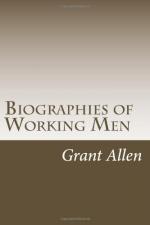By this time Edward began to make a few good friends. Several magistrates for the county signed a paper for him, stating that they knew him to be a naturalist, and no poacher; and on presenting this paper to the gamekeepers, he was generally allowed to pursue his researches wherever he liked, and shoot any birds or animals he needed for his new museum. Soon after his return from Aberdeen, too, he made the acquaintance of a neighbouring Scotch minister, Mr. Smith of Monquhitter, who proved a very kind and useful friend to him. Mr. Smith was a brother naturalist, and he had books— those precious books—which he lent Edward freely; and there for the first time the shoemaker zoologist learned the scientific names of many among the birds and animals with whose lives and habits he had been so long familiar. Another thing the good minister did for his shoemaker friend: he constantly begged him to write to scientific journals the results of his observations in natural history. At first Edward was very timid; he didn’t like to appear in print; thought his grammar and style wouldn’t be good enough; fought shy of the proposal altogether. But at last Edward made up his mind to contribute a few notes to the Banffshire Journal, and from that he went on slowly to other papers, until at last he came to be one of the most valued occasional writers for several of the leading scientific periodicals in England. Unfortunately, science doesn’t pay. All this work was done for love only; and Edward’s only reward was the pleasure he himself derived from thus jotting down the facts he had observed about the beautiful creatures he loved so well.
Soon Mr. Smith induced the indefatigable shoemaker to send a few papers on the birds and beasts to the Zoologist. Readers began to perceive that these contributions were sent by a man of the right sort—a man who didn’t merely read what other men had said about the creatures in books, but who watched their ways on his own account, and knew all about their habits and manners in their own homes. Other friends now began to interest themselves in him; and Edward obtained at last, what to a man of his tastes must have been almost as much as money or position—the society of people who could appreciate him, and could sympathize in all that interested him. Mr. Smith in particular always treated him, says Dr. Smiles, “as one intelligent man treats another.” The paltry distinctions of artificial rank were all forgotten between them, and the two naturalists talked together with endless interest about all those lovely creatures that surround us every one on every side, but that so very few people comparatively have ever eyes to see or hearts to understand. It was a very great loss to Edward when Mr. Smith died, in 1854.




